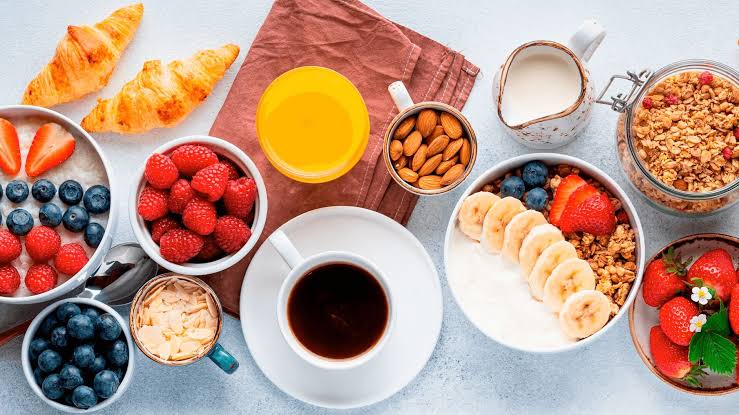Introduction
In a new study, researchers say what you eat at breakfast is just as important as how much you eat. People who consumed between 20% and 30% of their daily energy intake at breakfast and ate higher-quality foods showed improvements in waist circumference, triglycerides, and HDL (good) cholesterol.
Experts recommend healthy breakfast choices such as oatmeal, avocado toast, fruit, and eggs. Eating a substantial breakfast is important for heart health, but what you eat at that first meal of the day is also important. That’s the conclusion of a new study published in the Journal of Nutrition, Health and Aging.
Researchers examined the average energy intake of breakfast meals compared to a person’s total daily intake and the quality of the morning meals in terms of proteins, fats, fibers, and other nutrients. They concluded that a person who consumes an adequate amount of calories at breakfast and does so with high-quality food is at a lower risk of cardiovascular disease.
“Breakfast is the most important meal of the day, but what and how you eat it matters,” said Álvaro Hernáez, a researcher at the Hospital del Mar Research Institute’s CIBER for Cardiovascular Diseases (CIBERCV) in Spain, in a press release. “Eating controlled amounts not too much or too little and ensuring good nutritional composition is crucial. Our data show that quality is associated with better cardiovascular risk factor outcomes. It’s as important to have breakfast as it is to have a quality one,” Hernáez continued.
Impact of Healthy Breakfast on Heart Health
For their study, researchers examined 383 participants in the PREDIMED-Plus Project, a randomized clinical trial that compared the effects of a Mediterranean diet and regular physical activity with dietary recommendations. Participants were between the ages of 55 and 75 and were classified as overweight or having obesity. They also had at least three criteria for metabolic syndrome, a group of five risk factors that can increase the likelihood of heart disease, diabetes, and stroke.
The participants were followed for three years with measurements taken at the beginning of the study as well as at 24 months and 36 months. The researchers divided the subjects into three categories:
- less than 20% of daily energy intake is consumed at breakfast
- 20% to 30% of daily energy intake consumed at breakfast
- more than 30% of daily energy intake is consumed at breakfast
The researchers reported that people who consumed 20% to 30% of their energy intake at breakfast had 2% to 3% lower body mass index (BMI) measurements than participants who had less than 20% or higher than 30% of daily energy intake at breakfast. They added that the individuals in the 20% to 30% range also had:
- 2% to 4% smaller waist circumference
- 9% to 18% reduction in triglyceride levels
- 4% to 8% increase in the level of HDL or “good” cholesterol
In addition, the researchers said that participants who had high-quality breakfasts had:
- 1.5% smaller waist circumference
- 4% lower triglycerides
- 3% higher HDL cholesterol measurement
“Our body’s daily metabolic rhythms are governed by an internal clock that is affected by when we eat our meals,” explained Cheng-Han Chen, MD, an interventional cardiologist and medical director of the Structural Heart Program at MemorialCare Saddleback Medical Center in California.
You Like to Read: Balanced Diet: Key to a Healthier Life
Why Breakfast Matters Most
These new findings are not the first to find that a healthy and substantial breakfast is important for good health. In 2017, researchers reported that people who make breakfast their biggest meal of the day were more likely to lose weight than those who skipped breakfast or ate lighter meals in the morning. In 2020, another group of researchers reported that people who eat a big breakfast burn twice the calories daily compared to those who eat a larger dinner.
Other studies have concluded that eating a lot of protein at breakfast can also help people lose weight.
“Breakfast is important because it’s your first chance to fuel your body after an extended period of time without any nutrients,” Donelan said.
Eating a breakfast with protein, fiber, and fat regulates your metabolism and improves cognitive function and energy levels. Skipping breakfast can lead to overeating later in the day and create unnecessary blood sugar dips and spikes.
“Eating breakfast helps regulate our blood sugar control and helps to limit overeating later in the day. We also think that eating breakfast helps to prevent rises in stress hormones, which could then increase blood pressure,” Chen added.
Diet Quality Matters for Overall Health
Experts say diet quality is essential for overall health and well-being.
“Quality of diet is often a good indicator (over quantity) related to health,” Kirkpatrick said.
The ‘how much’ really boils down to how individuals are assessing their hunger and what aspects relate to those hunger cues (such as social aspects, sleep quality, etc.). However, there is a big difference between having a nutrient-rich breakfast (i.e., oats, eggs, etc.) and an empty-calorie breakfast (i.e., breakfast pastry, refined grains, etc.) in terms of health outcomes.
Nutritious Breakfast Ideas
In the new study, researchers defined a quality breakfast as one that included healthy amounts of protein, high-value fats, fiber, and minerals such as potassium and iron. In addition, these breakfasts avoided excessive added sugars and saturated fats.
In general, experts say this is the proper strategy when it comes to choosing breakfast foods. Gardner recommended the following suggestions for breakfast:
- whole grain cereal such as steel-cut oats with fruits and nuts.
- avocado toast on whole wheat grain toast with toppings such as kimchi or sautéed greens.
- veggie scramble with eggs sautéed with vegetables and herbs.
“Nutrient-dense options may include steel-cut oats, eggs, berries, avocado toast (on whole grain bread), yogurt with berries, etc.,” Kirkpatrick said. However, we can add to these meals (such as adding berries and hemp seeds to our oats or adding vegetables to our eggs like a frittata).
Chen recommends eating breakfast within one hour of waking up. He suggested foods such as:
- oatmeal
- eggs
- yogurt
- fresh fruit
“A balanced breakfast includes whole grains, protein, healthy fats, and fruit. This could be oatmeal with nuts and berries, Greek yogurt with fruit and granola, or avocado toast with eggs,” Donelan said.
Ali emphasized that people should choose natural foods and avoid highly processed products.

